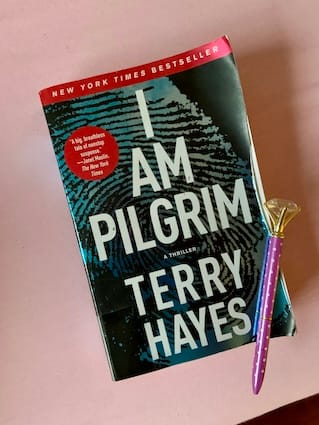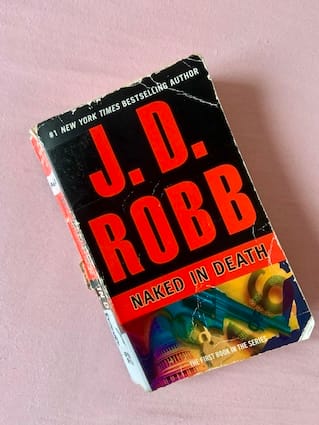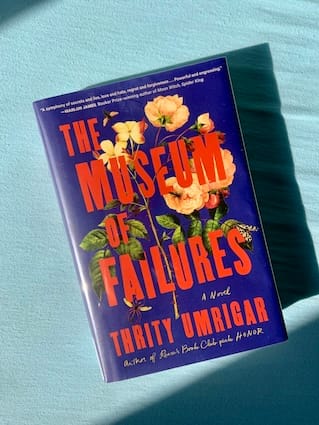books you may love: February 2024
A thriller, a mystery, and a heart-warming story of immigration and family secrets

I didn't read as much in February as I did last month, still I'm opting to have a separate post about them because I wanted to share an excerpt from one of the gems I read.

I Am Pilgrim by Terry Hayes is a spy-thriller tome of a book that took me several days to savour. It's a story of many seemingly disparate stories intricately woven together.
The blurb of the book says it best, so I will leave you with that.
A breakneck race against time...and an implacable enemy. An anonymous young woman murdered in a run-down hotel, all identifying characteristics dissolved by acid. A father publicly beheaded in the blistering heat of a Saudi Arabian public square. A notorious Syrian biotech expert found eyeless in a Damascus junkyard. Smoldering human remains on a remote mountainside in Afghanistan. A flawless plot to commit an appalling crime against humanity. One path links them all, and only one man can make the journey. Pilgrim.
Such an exciting book to read. So many different characters from so many different nations and cultures. What a thrilling and entertaining read it was!

The 'In Death' series by J. D. Robb (a pseudonym of Nora Roberts) is a murder mystery/police procedural series of 58 books and counting, set in the near future.
Roberts started writing them in the 1990s and set them in the year 2058 at the time. There's flying cars, real coffee has become a luxury, and such other quirks that set this world slightly apart from our own.
In this first book, Lt. Eve Dallas is called to investigate a string of murders of escorts. She has run-ins with some very powerful folks, and it all makes for one highly entertaining story!
And now the book I loved so much this month, because it helped me make sense of my own conflicting emotions as an immigrant in North America, pining for a homeland yet despising aspects of it at the same time.

The Museum of Failures by Thrity Umrigar tells the story of Remy Wadia, an Indian-American from a Parsi background, who goes to Mumbai in the hopes of adopting a child only to find out that his mother has been unwell and hospitalized without his knowledge, not to mention a huge family secret she has kept from him his entire life.
Over on her website, Umrigar talks about the inspiration for her book.
The idea for creating a protagonist like Remy Wadia, a successful Indian-American immigrant who is haunted by his past, came to me while watching the 2019 movie, The Farewell. After a teary parting from her beloved grandmother Nai Nai in China, the main character, Billi, leaves with her parents for the airport, to make their way back to New York. They watch as Nai Nai stands outside her home waving them goodbye. Leonard Cohen’s great hymn of solace, Come Healing, plays in the background as Billi sobs her way to the airport.
The splinters that you carried
The cross you left behind
Come healing of the body
Come healing of the mind
Has there ever been a more poetic description of immigration, its pull and push, its promise and its punishment? And does one ever stop carrying those splinters in one’s soul? Can the body and mind ever truly heal from what, in some ways, is the most counterintuitive thing of all—leaving behind those you love?
I felt that scene in my bones, on my skin, my tears merging with those shed by the characters on the screen. I remembered anew that searing pain of leaving behind family and friends, that heaviness with which one departs for the airport, a rending that never gets easier, that hollow feeling of the divided self, transplanted in new soil, yes, but also rooted in another.
I didn’t know the plot to The Museum of Failures at that moment. But I carried that feeling with me out of the movie theater and thought that I would perhaps try and capture it in a book someday.
~ Thrity Umrigar, Why I wrote The Museum of Failures
It is with this same tender and heartbreaking touch that Umrigar weaves the story of Remy and his parents. The aspects of Parsi life woven into the narrative were warm and inclusive, and it was such a delight to read it all.
Off late, I've been wishing we hadn't moved away from India in the first place. My brother and I grew up in India at a time when the most coveted path for growth and success was to secure a degree in engineering and go to the US for higher studies and the promise of a great life.
In hindsight, I really wish we had been taught to enjoy the life we had, the family we had, listen to our own true voices, instead of being taught to look forward to 'getting away from it all'.
Because now I really miss my parents, but trying to make a move back to India, a country I haven't even visited in more than a decade now, and making decisions for little D and his schooling and childhood in an completely new place feels so daunting I try not to think about it.
Not that I think living in the western world is without its flaws. People are people everywhere, driven by fears and desires. And the places that once called themselves 'developed' and delegated many other nations to the forever 'developing' quota have repeatedly shown us the cracks in their facade.
I'm forever caught in this dilemma. On one hand I try to feel grateful for the life we have here. On the other hand, I also feel miserable, being away from my loved ones.
For me, being with family has always held great importance (until people start being mean and unkind towards each other in their words and deeds, which is somewhat of an accepted norm in Indian families, although I can't bear that kind of family dynamics anymore!)
It's the reason why I moved back from the UK to India back in 2007, because I just didn't like being away from KrA.
Anyhoo, I'm rambling. But now you'll understand why this excerpt below from The Museum of Failures resonated with me a great deal!
Remy sighed. "It's the same thing in the US right now, boss," he said. "Everything is 'America first'. They act as if the rest of the world doesn't exist."
"Well, that's not exactly new. Remember when we were kids we used to joke that Americans knew more about outer space than about other countries?"
Remy nodded. When he'd arrived in America in 2003, he had been amazed by the display of American flags everywhere, even at car dealerships, and had found such jingoism mortifying. Two years earlier, he'd read about the horror of 9/11 in the Times of India, and he'd felt the same outrage as the rest of the world. He'd understood the groundswell of patriotism that gripped the US in the aftermath of the attacks. But in the weeks and months that followed, it became obvious that the tragedy was being used as a cudgel to beat up the weak — the attacks on Muslims and Sikhs in New York, the brown-skinned civilians bombed back to the Stone Age in Afghanistan, and later, the fantastical invasion of Iraq. But what was happening in America today was something Remy could've never foreseen.
Despite it many blind spots, he'd never imagined the US as anything other than extraordinary, unique, the Alphonso mango of nations. Now, for the first time, it seemed ... ordinary. He now lived in a country riven by the same tribalism and hatreds that haunted lesser nations. He had always seen American democracy as a giant oak tree, with roots that went more than two hundred years deep. But it turned out the roots were shallow, held in place by custom and good manners, and all it took to lay them bare was one man who refused to play by the rules of civility and democracy.
~ The Museum of Failures by Thrity Umrigar
It's an amazing thing that works of such beauty and deep authenticity exist and are easily accessible in our times. It's easy to slip into a more beautiful world by simply opening up the pages of a heart-touching, soul-stirring book.
Thank you, Thrity, for writing such a lovely book. It was a much needed balm for my aching soul.